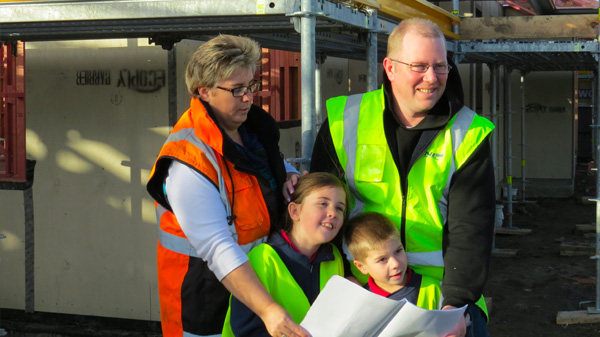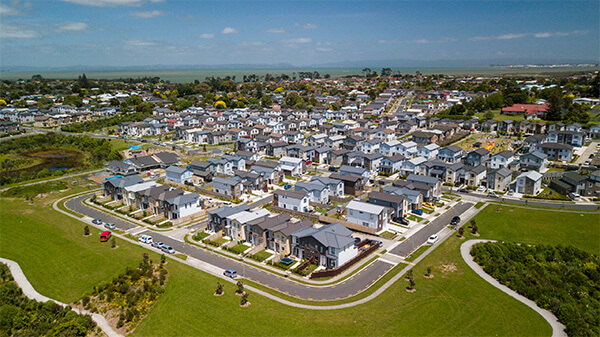In the early 2000s The Tindall Foundation (TTF) was receiving hundreds of funding applications a month requesting help for Kiwis to buy their own homes. The dream of owning a home had always been alive and well in Aotearoa/New Zealand, but a tough economic climate was making the dream increasingly unachievable for many working families. TTF Trustees knew that not owning a home is often associated with intergenerational poverty and inequality; on the other hand, home ownership can be critical to family and community stability, and provide a pathway out of poverty. The goal emerged of creating a model of affordable housing options for working families — at scale.
Addressing that goal would require significant focus, resources, time and funding, TTF realised. So in 2001 it brought together a governance group that established the charitable trust now known as the New Zealand Housing Foundation (NZHF). Brian Donnelly joined as CEO, with the mandate to become a catalyst for change in the housing sector by creating a range of affordable options for working families.
Using the impact investment model as its primary tool, TTF has provided catalyst funding by way of $2 million in grant/readiness funding, and over $10 million in loans, long-term mortgages and equity products. Since its start-up, NZHF has built and project managed over 850 homes and brought over 400 families into its home-ownership programmes. That success has given confidence to commercial and other philanthropic funders, which now invest in its programme.
How does it work?
NZHF developed two pathways to home ownership: Rent to Own (RTO) and Shared Ownership. The RTO pathway supports families into renting a new home by setting the rent at an affordable level (generally no more than 30% of their gross income). That allows the households to work on clearing any debts and start saving for a deposit, including signing up for KiwiSaver if they are not already members. After five years, as long as the family has cleared their debts and saved for a small deposit, they are able to purchase their home using NZHF’s shared ownership product.
The Shared Ownership pathway begins with a family who have too small a deposit to purchase a modest low-priced house and incomes too low to sustain a small mortgage. NZHF allows low-income working families to purchase at least 60% of a house with an affordable mortgage and a small deposit; NZHF owns the share of the house that the family cannot afford to purchase. Regardless of their share, the family has full privileges of home ownership, and can choose to buy out NZHF as they go. The programme targets working families who typically have a deposit of at least $10,000 and a before-tax income of between $65,000 and $100,000
As well as being effective for working families, these models have also proven financially sustainable for NZHF.
What has been achieved?
Although NZHF had piloted its RTO and Shared Ownership programme at a small scale in South Auckland, its development in the West Auckland suburb of Glen Eden, completed off West Coast Road in 2012, trialled it at a larger scale. Of the 73 new homes built, it set aside 49 for the Shared Ownership and RTO models. The remaining houses were sold at cost, mostly to other community-housing providers with a small number of private sales, which recouped some investment and ensured that the pilot project was financially viable and well positioned for growth. Families in the development reported feeling a great pride in their homes and community.
Collaboration has involved other private funders, banks, community housing providers, iwi, other Måori organisations and government agencies, including what was then known as Housing New Zealand. Over the years NZHF then refined the model and accessed capital for further developments. It brought in community organisations, iwi and Housing New Zealand to help promote the programmes to eligible families. As a result, NZHF now works annually with between fifty and a hundred families who want to own their own home.
Since 2007 the Housing Foundation has project managed or built over 850 homes in more than 20 locations across Auckland and Christchurch, with smaller developments in Kaikohe, Kaitaia and the Coromandel. Four developments are presently underway in Auckland (Manukau, Mangere, Flat Bush and Tāmaki) and are set to house a further 150 families. Affordable housing for Māori has been an area of renewed focus since 2014, and the foundation has grown its partnerships with iwi groups including Te Runanga o Ngāi Tahu, Waikato Tainui and Te Tumu Kainga (Māori Trustee) to help them provide home ownership opportunities for whānau/families. Since 2001, the Housing Foundation RTO and shared ownership products have supported more than 150 Māori whānau into their own affordable homes.
Gaining ownership of warm, dry and secure homes through NZHF has improved the general health of the families concerned. Homeowners report an increased positivity that in some cases has led to improved employment opportunities. Their children have higher school-attendance rates.
Dominic Foote, the current Housing Foundation CEO, has been leading work with government to help grow the programme. Recently the government announced it would start funding the NZHF model to offer progressive home ownership for first-home buyers. Dominic describes this as “A bold, historically significant, game-changing move for New Zealand’s first-home buyers.”
What has been learnt?
NZHF has learnt a lot since it began 19 years ago. A growing awareness that being close to the community is key led it to allow many of its team to work remotely, close to its developments. Understanding that for some families the fear of a mortgage outweighs the desire to own a home, the foundation now runs community-education evenings and workshops to explain the programme and allay fears of debt. Maintaining a profile in the community, and especially connecting with Māori and Pasifika whānau, has helped break down barriers and establish high-trust relationships.
Several years can be required from conceptualising a housing development, through gaining trust with families, communities and investors, up to completing the development and actually housing families. This requires patient people and patient capital. The rising cost of housing makes it more challenging to create truly affordable homes, and so NZHF needs to work in tandem with banks and private funders to offer the best possible packages to families on modest incomes.
Putting effort into the front end of each project ensures the needs of whānau and communities are met. Assisting the current team of 12 full and part-time staff are specialist contractors who oversee housing construction, from land development through to families moving in to their new homes..
Lastly, NZHF has learnt that its model works. It is possible to house families for whom home ownership never seemed a viable option. It is possible to improve the wellbeing of families by helping them to afford to live in a new, warm, healthy and stable home in a diverse neighbourhood with a strong sense of belonging and community. It has been proven that these forms of financial products can deliver not only returns to investors but also a wide range of social and other benefits to families, communities and New Zealand as a whole.
Hopes and dreams
The New Zealand Housing Foundation would love to see shared ownership become an accepted part of a more diverse range of housing finance choices. Ideally, if a potential homeowner doesn’t fit traditional finance criteria, a bank might offer them the option to buy a home through a shared-ownership model — either the bank’s own product, or one from another funder.
NZHF aspires to develop and grow its work, because there are big parts of the housing market that aren’t yet being served. “New Zealand’s affordable housing sector is almost non-existent, which means large numbers of New Zealanders can’t afford to live in decent or suitable homes,” Dominic says. “We’d like to get into the space of helping our elderly population, who in many cases are living longer, retiring with debt and are worried about how they can afford to keep living in their community”.
“When someone retires and still has a mortgage, then how can they pay that off other than by selling their home and hoping they have enough money from the sale to purchase a small unit in another community? If a person is left with a little bit of cash but not enough to buy a small home, and hasn’t the income to sustain a small mortgage even if they could at their age, and they are not eligible for state housing — then who is there to help?” — Dominic Foote
Now that they have developed affordable solutions for low-income working families, NZHF would like to help our senior demographic to stay in the community they currently live in without having to move to a more affordable location. They aspire to develop a model, test it, trial it, get it out there and bring government on board to help scale it, so we can address this emerging issue for New Zealand’s ageing population.

